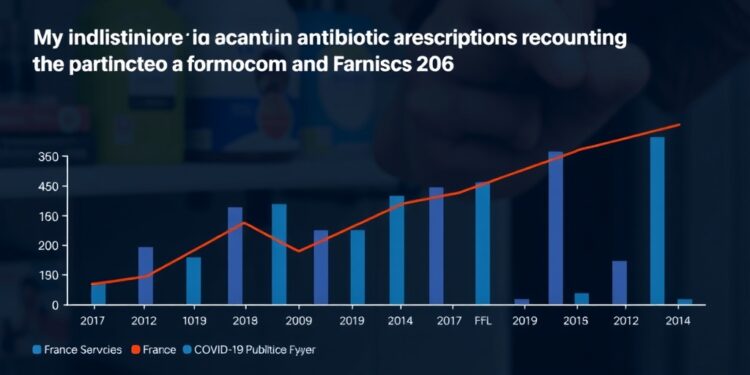The COVID-19 pandemic has reshaped numerous aspects of daily life, with healthcare practices experiencing particularly stark changes. In France, the impact of the pandemic, coupled with government-imposed lockdowns, led to notable shifts in healthcare access and prescribing behaviors, especially regarding the use of outpatient antibiotics. This period from 2020 to 2022 witnessed a significant transformation in how antibiotics were prescribed and utilized in the country, providing a valuable case study for understanding the broader effects of societal disruptions on medical practices.
The core of this investigation arose from a critical need to understand the dynamics of antibiotic prescriptions during a time when medical visits were severely restricted. Researchers employed an impressive dataset from France’s nationwide health insurance system, which covers approximately 67 million individuals, to analyze monthly trends in antibiotic use spanning from January 2010 to March 2022. This comprehensive dataset laid the groundwork for an interrupted time-series analysis, a sophisticated statistical approach designed to account for changes in prescribing patterns following the first national lockdown that commenced on March 17, 2020.
The findings from this nationwide study indicate a clear and significant decline in antibiotic use across multiple classes following the lockdown. The analysis revealed that most antibiotics experienced a substantial drop in prescriptions, with levels remaining consistently lower than anticipated for at least a year after the first lockdown. For instance, amoxicillin prescriptions decreased dramatically, with a staggering 27.5% reduction at three months post-lockdown, escalating to a 55.5% dip by the twelve-month mark. Similarly, the combination antibiotic amoxicillin-clavulanic acid saw a reduction of 10.9% initially, followed by a 24.9% decline over the year.
These reductions prompt critical questions about the prescribing habits prior to the pandemic. The substantial decrease in prescription rates for these agents, commonly utilized for respiratory and urinary tract infections, suggests that there may have been instances of overprescribing prior to the pandemic. The results signal a potential opportunity for health professionals to reassess their antibiotic prescribing strategies, emphasizing judicious use based on clinical guidelines rather than habit or patient demand.
Interestingly, some antibiotics did experience a temporary uptick in usage during this period, suggesting that not all changes in prescribing patterns were uniform. Antibiotics such as colistin, phenoxymethylpenicillin, and trimethoprim-sulfamethoxazole saw an increase among patients with chronic indications. This shift indicates the multifaceted nature of antibiotic prescribing, where certain situations necessitate increased use, even while overall trends show a decline.
In a notable departure from the predominant trend, azithromycin, an antibiotic often used to treat infections including pneumonia, maintained stable usage rates. Not only did this medication not experience the same level of decline—showing a minor 6.3% decrease deemed statistically insignificant at the three-month point—but it also saw a 2.7% increase in usage by the twelve-month post-lockdown mark. This resilience in azithromycin prescriptions raises further questions about its role in outpatient therapy during pandemics, especially concerning respiratory infections.
The broader implications of these findings are poignant, underscoring how health emergencies like the COVID-19 pandemic can create ripple effects across prescribing behaviors. With the indiscriminate use of antibiotics contributing to the growing global crisis of antimicrobial resistance, the notable reduction in prescriptions during the pandemic may offer a much-needed reprieve in some respects. Less antibiotic use could potentially alleviate some pressure on microbial ecosystems, giving healthcare systems a chance to address resistance issues more sustainably.
The pandemic has starkly revealed the balancing act required in healthcare, as practitioners navigate the complex interactions between patient care and public health imperatives. While the decline in antibiotic prescriptions suggests a shift towards more judicious use, the reliance on certain antibiotics remained prevalent, prompting a need for continuous education and guideline adherence among healthcare providers. The changes observed during the pandemic provide a rare opportunity to rethink and recalibrate the standard approaches to antibiotic use in outpatient settings.
Moreover, as the healthcare landscape evolves in the aftermath of the pandemic, it will be crucial for policymakers and health organizations to take a data-driven approach to monitoring antibiotic prescribing practices. Continuous surveillance and analysis of prescribing trends, particularly in the wake of significant societal disruptions, will be essential in maintaining effective strategies against infectious diseases while safeguarding the integrity of antibiotic therapy.
In light of these findings, the transition from pandemic conditions back to regular healthcare operations will require a concerted effort. Establishing pathways to refine prescribing practices while addressing chronic conditions that necessitate sustained antibiotic therapy will be vital. Key stakeholders, including healthcare professionals and public health authorities, must collaborate in crafting guidelines that reflect the lessons learned from this unprecedented period.
As we continue to navigate the repercussions of the COVID-19 pandemic on health care systems, the analysis of antibiotic prescribing trends provides a critical lens through which to assess our preparedness for future public health emergencies. Emphasizing the importance of evidence-based practices could lay the groundwork for more resilient healthcare delivery in the face of global health challenges.
The findings from this research not only illuminate the immediate impacts of the COVID-19 pandemic on antibiotic use in France but also serve to remind healthcare professionals of their pivotal role in managing antibiotic prescribing responsibly. With global health at stake, a collective commitment to rational antibiotic use remains paramount to mitigate the risks of antibiotic resistance and ensure effective treatment options for future generations.
Subject of Research: Changes in Outpatient Antibiotic Prescriptions in France During the COVID-19 Pandemic
Article Title: Changes in the Ambulatory Use of Antibiotics in France Due to the COVID-19 Pandemic in 2020-2022: A Nationwide Time-Series Analysis
News Publication Date: 24-Mar-2025
Web References: https://www.annfammed.org/content/23/2/158
References: N/A
Image Credits: N/A
Keywords: Antibiotics, COVID-19, Prescribing Patterns, Pandemic Impact, Health Care Access, Antibiotic Resistance.




